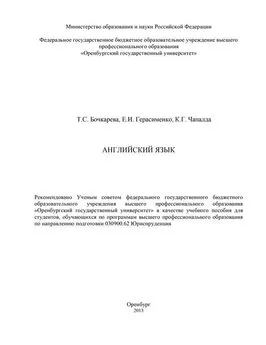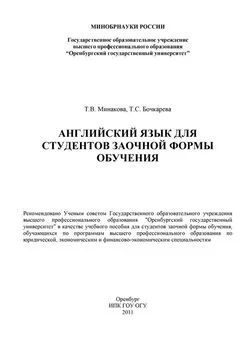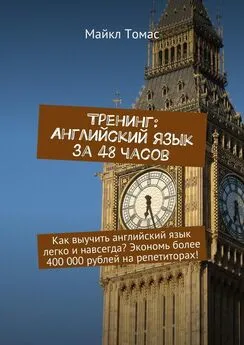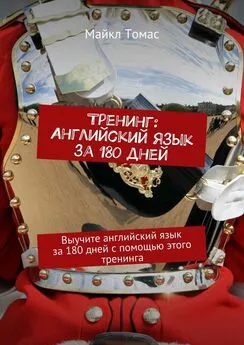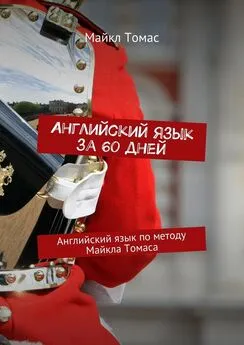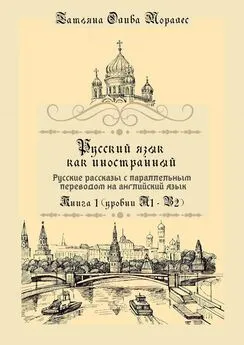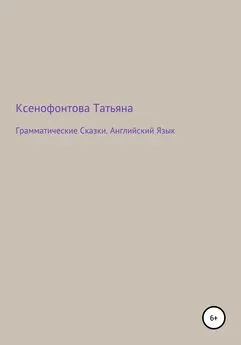Татьяна Бочкарева - Английский язык
- Название:Английский язык
- Автор:
- Жанр:
- Издательство:Литагент БИБКОМ
- Год:2013
- Город:Оренбург
- ISBN:нет данных
- Рейтинг:
- Избранное:Добавить в избранное
-
Отзывы:
-
Ваша оценка:
Татьяна Бочкарева - Английский язык краткое содержание
Английский язык - читать онлайн бесплатно ознакомительный отрывок
Интервал:
Закладка:
8) Quarter Sessions – суд четвертных (квартальных) сессий;
9) Privy Council – Тайный совет;
10) Queen’s Bench Division – Отделение королевской скамьи Высокого суда правосудия (осуществляет надзор за низшими судами; рассматривает важнейшие уголовные дела);
11) trier of fact – лицо, решающее вопрос факта (напр. эксперт, выступающий в суде).
Her Majesty's Courts of Justice of England and Wales are the civil and criminal courts responsible for the administration of justice in England and Wales; they apply the law of England and Wales and are established under Acts of the Parliament of the United Kingdom.
The United Kingdom does not have a single unified judicial system − England and Wales have one system, Scotland another, and Northern Ireland a third. There are exceptions to this rule; for example in immigration law, the Asylum and Immigration Tribunal's jurisdiction covers the whole of the United Kingdom, while in employment law there is a single system of Employment Tribunals for England, Wales, and Scotland (but not Northern Ireland). The Court of Appeal, the High Court, the Crown Court, the Magistrates' Courts, and the County Courts are administered by Her Majesty's Courts Service, an executive agency of the Ministry of Justice. The Supreme Court is the highest appeal court in almost all cases in England and Wales. Prior to the Constitutional Reform Act 2005 this role was held by the House of Lords. The Supreme Court is also the highest court of appeal for devolution matters, a role previously held by the Privy Council . The Privy Council is the highest court of appeal for a small number of Commonwealth countries, colonies and the Channel Islands and the Isle of Man. There are a number of smaller statutory jurisdictions, such as appeals from ecclesiastical and professional bodies. The judges who sit on the Judicial Committee of the Privy Council are also the members of the Supreme Court.
The Court of Appeal deals only with appeals from other courts or tribunals. The Court of Appeal consists of two divisions: the Civil Division hears appeals from the High Court and County Court and certain superior tribunals, while the Criminal Division may only hear appeals from the Crown Court connected with a trial on indictment. Its decisions are binding on all courts apart from the Supreme Court. The Crown Court is a criminal court of both original and appellate jurisdiction which in addition handles a limited amount of civil business both at first instance and on appeal. It replaced the Assizes whereby High Court judges would periodically travel around the country hearing cases, and Quarter Sessions which were periodic county courts. The Old Bailey is the unofficial name of London's most famous Criminal Court, which is now part of the Crown Court. Its official name is the "Central Criminal Court". The Crown Court also hears appeals from Magistrates' Courts. The Crown Court is the only court in England and Wales that has the jurisdiction to try cases on indictment and when exercising such a role it is a superior court in that its judgments cannot be reviewed by the Administrative Court of the Queen’s Bench Division of the High Court.
Subordinate courts.The most common subordinate courts in England and Wales are the Magistrates' Courts, Family Proceedings Courts, Youth courts and County Courts. Magistrates' Courts are presided over by a bench of lay magistrates (or justices of the peace), or a legally-trained district judge, sitting in each local justice area. There are no juries. They hear minor criminal cases, as well as certain licensing applications. Youth courts deal with offenders aged between the ages of 10 and 17 inclusive. Youth courts are presided over by a specially trained subset of experienced Adult Magistrates or a District Judge. In addition some Magistrates' Courts are also a Family Proceedings Court and hear Family law cases including care cases and they have the power to make adoption orders. Family Proceedings Courts are not open to the public. County Courts are statutory courts with a purely civil jurisdiction. They are presided over by either a District or Circuit Judge and, except in a small minority of cases such as civil actions against the Police, the judge sits alone as trier of fact and law without assistance from a jury. County courts have divorce jurisdiction and undertake private family cases, care proceedings and adoptions. However, in general any county court in England and Wales may hear any action and claims are frequently transferred from court to court.
1.2.2 Переведите следующие слова и выражения на русский язык:
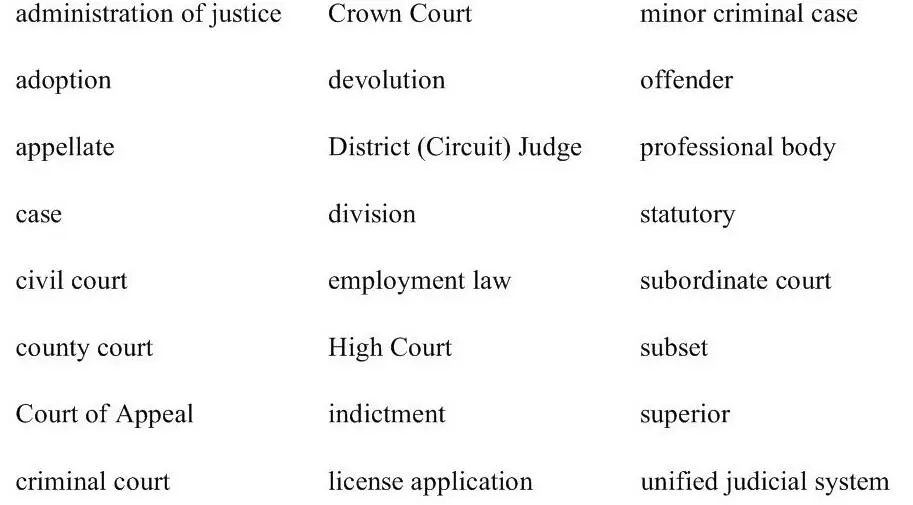
1.2.3 Прочитайте следующие утверждения и укажите, являются ли они верными:
1) Her Majesty's Courts of Justice of England and Wales is the highest appeal court in almost all cases in England and Wales.
2) Her Majesty's Courts of Justice of England and Wales are established under Acts of the Parliament of the United Kingdom.
3) The United Kingdom has a single unified judicial system.
4) The Asylum and Immigration Tribunal's jurisdiction covers the whole of the United Kingdom.
5) The House of Lords is the highest appeal court in almost all cases in England and Wales.
6) The Privy Council is the highest court of appeal for a small number of Commonwealth countries.
7) The Court of Appeal deals only with appeals from other countries.
8) The Crown Court is a criminal court of both original and appellate jurisdiction.
9) The Crown Court was replaced by the Assizes whereby High Court judges would periodically travel around the country hearing cases.
10) Magistrates' Courts deal with offenders aged between the ages of 10 and 17 inclusive.
1.2.4 Переведите текст со словарем.
1.2.5 Составьте 10 вопросов к тексту.
1.2.6 Выберите ключевые предложения, перескажите текст, используя выражения: «The subject of the text is…», «The text deals…», «The main idea of the text is…», «The author comments on …».
1.3 Модуль 3. Текст Law
1.3.1 Прочитайте и переведите текст. Запомните следующие выражения латинского происхождения:
1) actus reus − противоправное действие, правонарушение (физическая, объективная сторона преступления);
2) mens rea – виновная воля;
3) dolus directus – прямой умысел;
4) dolus directus – случайный умысел;
5) pacta sunt servanda – договоры следует соблюдать.
1.3.2 Прочитайте текст и найдите ответы на вопросы:
1) What is law?
2) Can you say anything about the history of law?
Law is a system of rules, usually enforced through a set of institutions. It shapes politics, economics and society in numerous ways and serves as a primary social mediator of relations between people. Contract law regulates everything from buying a bus ticket to trading on derivatives markets. Property law defines rights and obligations related to the transfer and title of personal and real property. Trust law applies to assets held for investment and financial security, while tort law allows claims for compensation if a person's rights or property are harmed. If the harm is criminalized in a statute, criminal law offers means by which the state can prosecute the perpetrator. Constitutional law provides a framework for the creation of law, the protection of human rights and the election of political representatives. Administrative law is used to review the decisions of government agencies, while international law governs affairs between sovereign nation states in activities ranging from trade to environmental regulation or military action.
Legal systems elaborate rights and responsibilities in a variety of ways. A general distinction can be made between civil law jurisdictions, which codify their laws, and common law systems, where judge made law is not consolidated. In some countries, religion still informs the law. In a typical democracy, the central institutions for interpreting and creating law are the three main branches of government, namely an impartial judiciary, a democratic legislature, and an accountable executive. To implement and enforce the law and provide services to the public, a government's bureaucracy, the military and police are vital.
International law can refer to three things: public international law, private international law or conflict of laws and the law of supranational organizations. Public international law concerns relationships between sovereign nations. The sources for public international law development are custom, practice and treaties between sovereign nations, such as the Geneva Conventions. Public international law can be formed by international organizations, such as the United Nations, the International Labor Organization, the World Trade Organization, or the International Monetary Fund. Public international law has a special status as law because there is no international police force, and courts (e.g. the International Court of Justice as the primary UN judicial organ) lack the capacity to penalize disobedience. However, a few bodies, such as the WTO, have effective systems of binding arbitration and dispute resolution backed up by trade sanctions.
Constitutional and administrative laws govern the affairs of the state. Constitutional law concerns both the relationships between the executive, legislature and judiciary and the human rights or civil liberties of individuals against the state. Most jurisdictions, like the United States and France, have a single codified constitution, with a Bill of Rights. A few, like the United Kingdom, have no such document. A "constitution" is simply those laws which constitute the body politic, from statute, case law and convention.
The fundamental constitutional principle, inspired by John Locke, holds that the individual can do anything but that which is forbidden by law, and the state may do nothing but that which is authorized by law. Administrative law is the chief method for people to hold state bodies to account. People can apply for judicial review of actions or decisions by local councils, public services or government ministries, to ensure that they comply with the law.
Criminal law , also known as penal law, pertains to crimes and punishment. It thus regulates the definition of and penalties for offences found to have a sufficiently deleterious social impact but, in itself, makes no moral judgement on an offender nor imposes restrictions on society that physically prevents people from committing a crime in the first place. Investigating, apprehending, charging, and trying suspected offenders are regulated by the law of criminal procedure. The paradigm case of a crime lies in the proof, beyond reasonable doubt, that a person is guilty of two things. First, the accused must commit an act which is deemed by society to be criminal, or actus reus (guilty act). Second, the accused must have the requisite malicious intent to do a criminal act, or mens rea (guilty mind). However for so called "strict liability" crimes, an actus reus is enough. Criminal systems of the civil law tradition distinguish between intention in the broad sense (dolus directus and dolus eventualis), and negligence. Negligence does not carry criminal responsibility unless a particular crime provides for its punishment.
Читать дальшеИнтервал:
Закладка:
